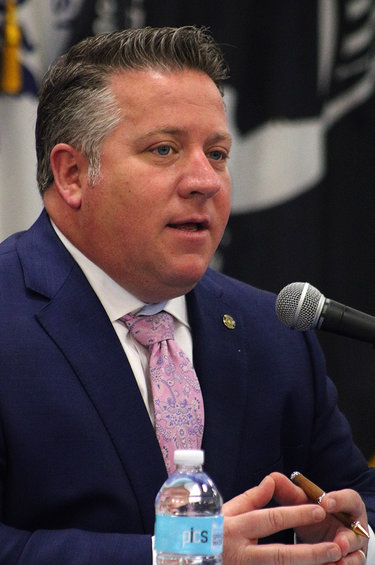County death toll climbs to 36
ALBANY COUNTY — On Sunday, four more Albany County residents died of COVID-19, bringing the county’s death toll to 36.
One of the patients was a man in his seventies. The other three were women — two in their eighties and one in her nineties. Like the vast majority of county residents who have died of coronavirus disease 2019, each of them had underlying health conditions.
As of Monday morning, the county had 937 confirmed cases of COVID-19 with 812 people under mandatory quarantine and 35 people under precautionary quarantine. To date, 2,027 county residents have completed quarantine, with 478 of them having tested positive and recovered.
“We are being aggressive compared to other counties,” said Albany County Executive Daniel McCoy at his Monday morning press briefing, speaking of the county’s diagnostic testing for COVID-19. “That will help us open up,” he said.
Meanwhile, though, the governor announced that state-run diagnostic testing facilities are being opened in five counties.
Forty-three Albany County residents are currently hospitalized with six of them in intensive-care units. One is under age 25 and three are between ages of 26 and 49 while 23 are between the ages of 50 and 74 and 16 are 75 or older.
Also on Monday, Governor Andrew Cuomo announced results of the second phase of statewide antibody testing, which showed 14.9 percent of New Yorkers have antibodies to COVID-19. Results from the first round of these finger-prick blood tests showed that 13.9 percent of New Yorkers had had the disease.
The rates are far higher downstate than upstate. Long Island, for example, is at 14 percent while the Mohawk Valley is at 2.6 percent, the North Country is at 1.2 percent, and the Capital District is at 2.1 percent.
“Different situations, different strategy going forward,” said Cuomo.
He said he gets a lot of calls from local officials, wanting to reopen. “Know what you are doing before you do it,” said Cuomo. He said he would be extending the May 15 “pause,” which shut down schools and non-essential businesses, “in many parts of the state.”
Cuomo also said that, starting Monday, the state began testing New York City’s frontline workers for antibodies; 1,000 each of police and firefighters across the city’s five boroughs were tested on Monday. Later this week, 3,000 health-care workers and 1,000 transit workers will be tested for antibodies.
Cuomo announced, too, that drive-through diagnostic testing facilities are opening in Monroe, Erie, Broome, Niagara, and Oneida counties. On Saturday, the state expanded diagnostic testing criteria to include all first responders, health-care workers, and essential employees even if they aren’t symptomatic.
They will be able to get tested for COVID-19 at the new drive-through facilities. Residents who would like to be tested at these facilities must make an appointment by calling 888-364-3065 or by going online to www.covid19screening.health.ny.gov.
Albany County already has a state-run drive-through testing site, which opened in mid-April at the uptown University at Albany campus.
Also in Albany County, the federal government and Rite Aid have set up a drive-through testing site in Colonie.
Additionally the county, working with the Whitney M. Young Jr. Health Center, has set up for mobile walk-up testing sites for high-risk neighborhoods. From those mobile sites, McCoy said on Monday, 42 people have tested positive for COVID-19, which is just under 10 percent of those tested.
Albany County’s health commissioner, Elizabeth Whalen, said on Monday morning that, of the 9,060 Albany County residents tested so far, 10.5 percent have tested positive.
“We’re starting to see it go up a little from around the 7 percentile,” she said.



